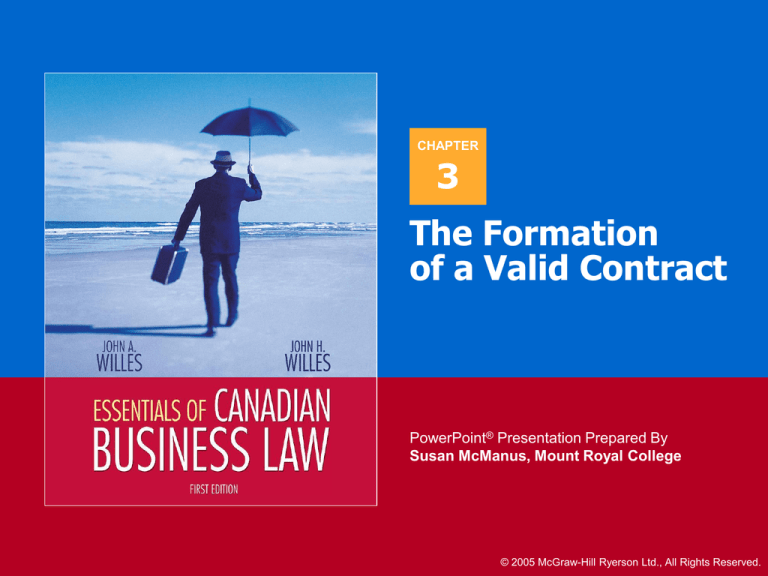
CHAPTER
3
The Formation
of a Valid Contract
PowerPoint® Presentation Prepared By
Susan McManus, Mount Royal College
© 2005 McGraw-Hill Ryerson Ltd., All Rights Reserved.
CH 3
LEARNING OBJECTIVES
Examine the role of contracts in business
Understand the elements of a valid contract
Determine how contracts are formed
Outline the rules relating to the creation of a valid
contract
Essentials of Canadian Business Law, 1st Canadian Edition
Slide 3-1
© 2005 McGraw-Hill Ryerson Ltd., All Rights Reserved.
3.2
Elements of a Valid Contract
Contract – an agreement enforceable at law
A valid contract consists of six elements:
1.
2.
3.
4.
5.
6.
Intention to create a legal relationship
Offer
Acceptance
Consideration
Capacity to contract
Legality
Essentials of Canadian Business Law, 1st Canadian Edition
Slide 3-2
© 2005 McGraw-Hill Ryerson Ltd., All Rights Reserved.
3.3
Intention To Create A Legal Relationship
Presumption at law: parties in any commercial
transaction make promises with the intention to
become legally obligated to fulfill them
Intention is not presumed by family members, and
if contested the court will review the statements
from a “reasonable person” point of view
Essentials of Canadian Business Law, 1st Canadian Edition
Slide 3-3
© 2005 McGraw-Hill Ryerson Ltd., All Rights Reserved.
Figure 3-1
Intention of
the Parties
Essentials of Canadian Business Law, 1st Canadian Edition
Slide 1-4
© 2005 McGraw-Hill Ryerson Ltd., All Rights Reserved.
3.3
Intention To Create A Legal Relationship (Cont’d)
Advertisements and goods on display are not
normally enforceable promises as advertisers
usually only attempt to describe or present their
goods
Courts will review all facts and did in fact find there
was a valid contract in Carlill v. Carbolic Smoke Ball
Co. @ page 65
Essentials of Canadian Business Law, 1st Canadian Edition
Slide 3-5
© 2005 McGraw-Hill Ryerson Ltd., All Rights Reserved.
3.3
Intention To Create A Legal Relationship (Cont’d)
Invitation to do business
Invites the public (offeror) to make
offers, which the seller (offeree)
can accept or reject
Advertisements and displays of
goods, even with prices
Essentials of Canadian Business Law, 1st Canadian Edition
Slide 3-6
© 2005 McGraw-Hill Ryerson Ltd., All Rights Reserved.
Figure 3-2
Offer and
Acceptance
Essentials of Canadian Business Law, 1st Canadian Edition
Slide 1-7
© 2005 McGraw-Hill Ryerson Ltd., All Rights Reserved.
3.4
Offer and Acceptance
Offer and Acceptance:
Offeror makes a tentative promise subject to a
condition, which is not binding until accepted
Offeree receives the offer and may accept, reject
or counter-offer
Communication of an Offer
1. Must be communicated to the offeree
2. Only the specific offeree may accept
Essentials of Canadian Business Law, 1st Canadian Edition
Slide 3-8
© 2005 McGraw-Hill Ryerson Ltd., All Rights Reserved.
Figure 3-3
Forms of
Acceptance
Essentials of Canadian Business Law, 1st Canadian Edition
Slide 1-9
© 2005 McGraw-Hill Ryerson Ltd., All Rights Reserved.
3.4
Offer and Acceptance (Cont’d)
Acceptance of an Offer
1. Acceptance must be communicated to the offeror
in the manner requested or implied in the offer,
and will be complete when the offeror is made
aware
Mail – acceptance occurs when placed in the postbox
All other modes of communication – acceptance
occurs when the offeror is aware, usually receipt of
acceptance
Essentials of Canadian Business Law, 1st Canadian Edition
Slide 3-10
© 2005 McGraw-Hill Ryerson Ltd., All Rights Reserved.
3.4
Offer and Acceptance (Cont’d)
Acceptance of an Offer
2. Acceptance must be unconditional
Any change is a counter-offer
3. Silence cannot be considered acceptance unless
there is a pre-existing agreement
Consumer legislation protects against this type of
stipulation
What could happen if silence could be deemed
acceptance of an offer?
Essentials of Canadian Business Law, 1st Canadian Edition
Slide 3-11
© 2005 McGraw-Hill Ryerson Ltd., All Rights Reserved.
3.4
Offer and Acceptance (Cont’d)
Acceptance of an Offer
4. Unilateral agreements
Acceptance is by performance of an act
What examples are there of unilateral contracts?
Essentials of Canadian Business Law, 1st Canadian Edition
Slide 3-12
© 2005 McGraw-Hill Ryerson Ltd., All Rights Reserved.
3.4
Offer and Acceptance (Cont’d)
Lapse of an Offer
Death, insanity or bankruptcy of either party before
acceptance
Rejection
Counter-offer: any changes to the offer by the
offeree
No acceptance within a reasonable time
(dependent upon facts or within a set time-limit)
Essentials of Canadian Business Law, 1st Canadian Edition
Slide 3-13
© 2005 McGraw-Hill Ryerson Ltd., All Rights Reserved.
3.4
Offer and Acceptance (Cont’d)
Revocation of an Offer
Offeror may actively revoke (withdraw) the offer
any time before acceptance
Agreement by the offeror to keep the offer open for a
specified time is gratuitous and not binding
An option (by payment or under seal) is used to
ensure the offer will not be revoked
Essentials of Canadian Business Law, 1st Canadian Edition
Slide 3-14
© 2005 McGraw-Hill Ryerson Ltd., All Rights Reserved.
3.4
Offer and Acceptance (Cont’d)
Revocation of an Offer
Offeree must be aware of the revocation before
acceptance
Receive revocation notice, including a letter of
revocation
Indirect notice
From a reliable source
Offeror must prove the offeree would know of the
revocation
Essentials of Canadian Business Law, 1st Canadian Edition
Slide 3-15
© 2005 McGraw-Hill Ryerson Ltd., All Rights Reserved.
3.5
Consideration
Essential element of contract:
Both parties must receive something in return
No consideration - promise is gratuitous, and not
legally binding (a gift)
Essentials of Canadian Business Law, 1st Canadian Edition
Slide 3-16
© 2005 McGraw-Hill Ryerson Ltd., All Rights Reserved.
3.5
Consideration (Cont’d)
Seal
gives a contract consideration when affixed at the
time of signing
Forms may include gummed wafer to corporate seals
Tenders
offers made in response to a call for tenders,
usually required to be irrevocable under seal
Essentials of Canadian Business Law, 1st Canadian Edition
Slide 3-17
© 2005 McGraw-Hill Ryerson Ltd., All Rights Reserved.
3.5
Consideration (Cont’d)
Adequacy
Must be of value, but courts will not look into
fairness of the price
Must be present or future promise
Past consideration: promise based on something
already received - gratuitous promise and not
binding
Promise based on entitlement by law or contract gratuitous promise
Essentials of Canadian Business Law, 1st Canadian Edition
Slide 3-18
© 2005 McGraw-Hill Ryerson Ltd., All Rights Reserved.
3.5
Consideration (Cont’d)
Adequacy
Goods or services received or provided with no set
price may have the court determine a reasonable
price
How could parties deliver goods or provide
services without settling on a price or other
consideration?
Essentials of Canadian Business Law, 1st Canadian Edition
Slide 3-19
© 2005 McGraw-Hill Ryerson Ltd., All Rights Reserved.
3.5
Consideration (Cont’d)
Debtor-Creditor
Agreement to take less is gratuitous promise
Binding if:
Written & sealed
Payment before the due date
Third party pays
Legislation binds creditors
to lesser amounts
Essentials of Canadian Business Law, 1st Canadian Edition
Slide 3-20
© 2005 McGraw-Hill Ryerson Ltd., All Rights Reserved.
3.6
The Debtor-Credit Relationship
Debtor – Creditor Relationship &
Consideration
Consolidation schemes have consideration, as the
promise by all creditors to take less is the
exchange of promises
Equitable or Promissory Estoppel
Defence by the debtor against a claim to enforce the
contract
Promisee must prove reliance on the truth of the
gratuitous promise to his or her detriment
Essentials of Canadian Business Law, 1st Canadian Edition
Slide 3-21
© 2005 McGraw-Hill Ryerson Ltd., All Rights Reserved.
3.8
Capacity to Contract
Law offers protection for classes of persons
1. Minors: under age set out in legislation (18 or
19 years)
Not liable under most contracts
Necessaries: liable for a reasonable price
Non-necessaries
If not fully performed, may repudiate
Long term and continuing nature must be repudiated
upon reaching majority
Not of continuing nature must be ratified
Essentials of Canadian Business Law, 1st Canadian Edition
Slide 3-22
© 2005 McGraw-Hill Ryerson Ltd., All Rights Reserved.
3.8
Capacity to Contract (Cont’d)
2. Drunken and Mentally Impaired
Persons
Necessaries: bound if reasonable price
Non-necessaries: may be avoided as soon as the
contract is brought to the person’s attention
Incapable of knowing his or her actions when entering
the contract
Other party knew of the condition
Essentials of Canadian Business Law, 1st Canadian Edition
Slide 3-23
© 2005 McGraw-Hill Ryerson Ltd., All Rights Reserved.
3.8
Capacity to Contract (Cont’d)
3. Corporations
Created by statute and may have limitations on ability to
contract by legislation or incorporating documents
4. Labour Unions
Created by statute and have specific abilities to contract
5. Bankrupt Persons
Created under statute and have limitations to enter contracts
(necessaries only and must reveal bankrupt status)
Essentials of Canadian Business Law, 1st Canadian Edition
Slide 3-24
© 2005 McGraw-Hill Ryerson Ltd., All Rights Reserved.
3.9
Legality
Contracts that
offend public policy are unenforceable (void and
have no rights enforced)
are prohibited by statute may also be illegal, as
well as unenforceable, and subject to fines and
penalties
What types of contracts are unenforceable, illegal
or both?
Essentials of Canadian Business Law, 1st Canadian Edition
Slide 3-25
© 2005 McGraw-Hill Ryerson Ltd., All Rights Reserved.
3.9
Legality
Contracts in restraint of trade
Void & unenforceable if
Undue and unreasonable restraints
contrary to the Competition Act
Essentials of Canadian Business Law, 1st Canadian Edition
Slide 3-26
© 2005 McGraw-Hill Ryerson Ltd., All Rights Reserved.
3.10
Contracts in Restraint of Trade
Restrictive Agreements
1. Sale of a Business: restriction of
competition is used to give value to goodwill
Courts may sever parts of the agreement, but will
NOT rewrite the terms
Restrictions must be reasonable as to
Geographical and time restraints
Public interest – not adversely affected
Essentials of Canadian Business Law, 1st Canadian Edition
Slide 3-27
© 2005 McGraw-Hill Ryerson Ltd., All Rights Reserved.
3.10
Contracts in Restraint of Trade (Cont’d)
Restrictive Covenants
2. Employment: not to compete
protection of business practices and business
secrets
generally void unless
serious harm to employer
reasonable restraints – not limiting employee’s
opportunities or their use of skill and knowledge
Restrictions during employment are usually valid as
employee should devote energy to employment
Essentials of Canadian Business Law, 1st Canadian Edition
Slide 3-28
© 2005 McGraw-Hill Ryerson Ltd., All Rights Reserved.
CH 3
SUMMARY
Six essential elements to form an
enforceable contract
1. Intention: presumed unless otherwise
demonstrated
2. & 3. Valid offer with complete acceptance
4. Consideration: exchange of promises
5. Capacity: protection of specific classes – minors,
drunken persons, and persons with mental
impairment
6. Legality: must not offend statutes or public policy,
which includes contracts in restraint of trade
Essentials of Canadian Business Law, 1st Canadian Edition
Slide 3-29
© 2005 McGraw-Hill Ryerson Ltd., All Rights Reserved.






